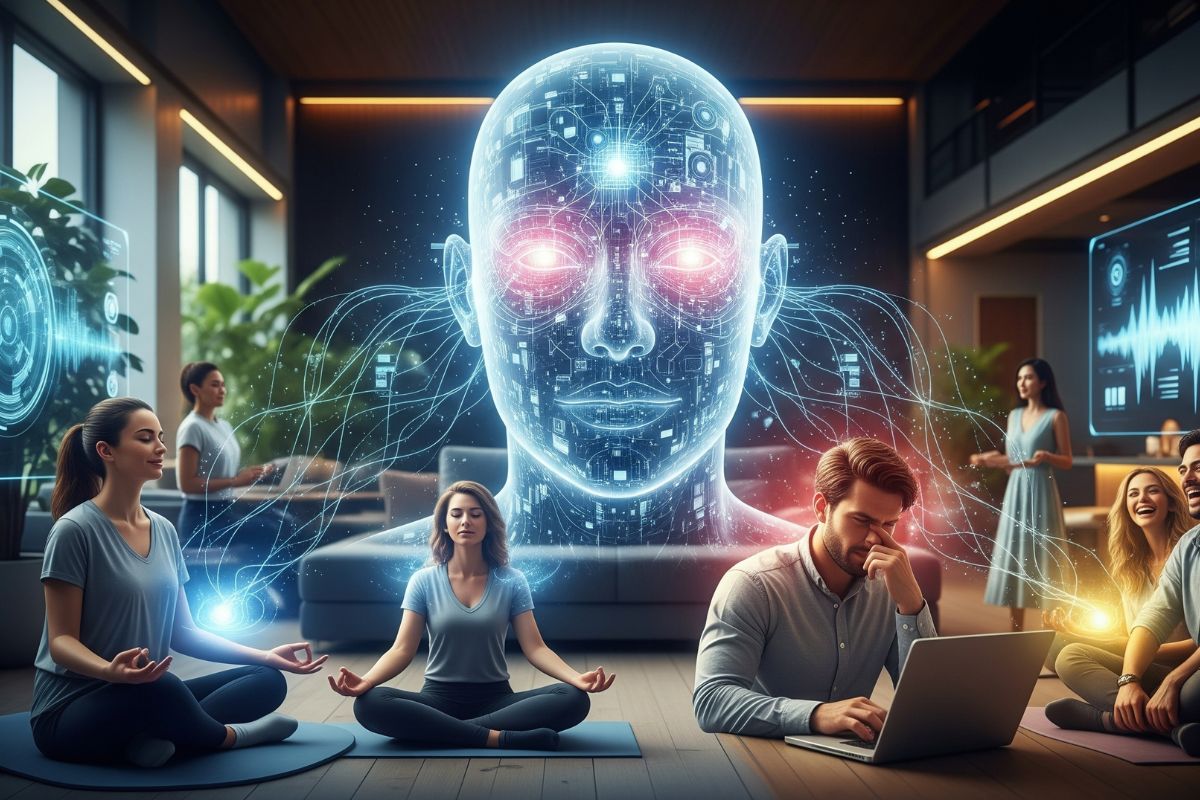The Rise of Emotionally Intelligent Artificial Intelligence
Consider this: What comes next in a world where AI plans your meetings, composes your emails, and even encourages you when you reach your step goal? Can the heart ever be reached by technology, with all its hiccups and data analysis? According to Mindvalley, a leader in personal growth education worldwide, it can. Presenting EVE, a unique AI companion designed to recognize and authentically react to your emotions rather than just another digital assistant.
Mindvalley Unveils EVE: Beyond Productivity, Toward Emotional Connection
Vishen Lakhiani, the founder of Mindvalley, came up with the idea for EVE and named it after his daughter. What about the idea? Eager. “Everyone Elevates” is what EVE stands for. Its goal is to help users not only get more done, but also become more whole, aware, and, to be honest, human.
Vishen puts it this way: Most AI makes you more productive. But EVE is made to help you grow. She is meant to remember things about you, keep track of your goals, find out what drives you, and help you change by suggesting things, listening, and sometimes just being there for you.
What Makes EVE Different?
Funny thing is, there’s no shortage of “smart” assistants. Siri, Alexa, your banking chatbot, they’re everywhere. But EVE aims higher, drawing on the collective knowledge of more than 100 world-renowned Mindvalley teachers. Think biohacker Dave Asprey. Or transformational leaders like Marisa Peer and Lisa Nichols. This isn’t about managing your calendar, it’s about nurturing your soul.
The Science (and Magic) of Emotion-Sensing AI
Real-Time Insights from Your Wearable Tech
Picture this: You strap on your Apple Watch or WHOOP band, and, as your heart rate fluctuates during a tense meeting or your skin conductivity spikes during an evening run, EVE listens. Not literally, of course, but by integrating seamlessly with these devices, EVE pulls in biometric data, heart rate variability, sleep patterns, stress markers, and more, to “read” your current emotional and physiological state.
- Heart Rate Variability (HRV): A window into your stress resilience.
- Skin Conductivity: Spikes when anxiety is high.
- Sleep Cycles and Body Temp: Indicators of physical/mental strain.
Each data point is another puzzle piece. EVE builds a moving, moment-by-moment portrait of your well-being. With your explicit permission, she uses those signals to craft tailored suggestions, ensuring you receive what you need, precisely when you need it. And here’s the kicker: this goes far beyond generic “relax more” notifications.
Holistic Wellness: Not Just Data, but Deep Guidance
EVE doesn’t just reflect information at you; she draws upon a deep library of Mindvalley wisdom to respond authentically. Say your stress markers are through the roof. EVE might suggest a breathwork exercise straight from Mindvalley’s top instructors. If you’re dragging after a poor night’s sleep, she could nudge you toward a restorative meditation, or, if you set it up, remind you to stick to your supplement routine.
Still, it’s not just about quick fixes. The vision, according to Mindvalley, is for EVE to someday integrate medical histories, diet data, and even lab work, providing truly individualized, real-time self-care recommendations, always with user consent at the center.
Innovative Features: What Users Get
Personalized Content, Voice, and Community
- Emotion-Based Coaching: EVE tunes into your mood and motivation, suggesting actionable strategies, think mindfulness practices when stress ticks up, or a grounding technique at the first sign of overwhelm.
- Custom Podcasts: Believe it or not, EVE can generate podcasts tailored to your goals and, get this, even delivered in your AI-cloned voice. Learning becomes a conversation with yourself.
- Accountability and Community: Through Mindvalley’s network, EVE connects users with others pursuing similar growth journeys, encouraging camaraderie and accountability.
Real-Time Support, Real Results
When life gets bumpy, your energy dips, or emotional triggers hit, the traditional advice might be “tough it out.” EVE, however, steps in gently, reminding you of the person you want to be, supporting you (not scolding) when you’re ready to give up. Early beta testers have reported deeper engagement with Mindvalley’s programs and habits that stick, sometimes for the first time.
Privacy, Ethics, and the Limits of Emotional AI
Now, here’s the twist: With great technological power comes even greater responsibility. How much data is too much? Where is the line between support and surveillance?
Vishen Lakhiani insists that user data always stays under the user’s control. Mindvalley builds EVE to the strictest European GDPR standards. And here’s a confession: early in the process, the team considered inserting real-time emotion-detection into EVE’s core. But when global regulators, especially in the European Union, indicated they might ban AI with such features, Mindvalley backed off, choosing ethics over ambition.
For now, EVE won’t manipulate your emotions. She reflects, suggests, gently reminds, but never pushes. All the nudges come from your own pre-set goals and aspirations. You’re always in the driver’s seat.
The Broader Picture: Emotional Intelligence Meets Artificial Intelligence
Why Does This Matter?
Let’s face it, most technology, up until very recently, has aimed at making us faster, more efficient, more productive. But the truth is, more to-do lists are not what most people need.
Here’s what makes EVE and similar emotional AI breakthroughs genuinely different:
- Empathy Over Efficiency: For the first time, tech promises not just to “do” but to “feel”, or at least, to listen more closely.
- Data-Driven Self-Awareness: Using AI, users gain tangible insights into emotional patterns, self-regulation, and even mental health triggers.
What Does Science Say About Emotional AI?
Research shows that emotional AI, sometimes called affective computing, relies on a mix of data: facial expressions, tone of voice, and biometric signals. It can diagnose stress, recommend calming interventions, and even adapt its responses over time to better serve each user’s emotional state. These advances push AI beyond mere efficiency. They’re changing how people interact with technology, making devices into digital companions capable of a kind of “empathy lite.”
Looking Ahead: The Ambient Future of EVE and Emotional AI

Vishen sees a world where AI like EVE disappears into everyday life, ambient in homes, cars, headphones, pretty much everywhere you go. Imagine: Your AI spots a subtle change in your walking gait, flagging a fall risk before it happens. For the elderly, that kind of tech could be game-changing. For anyone, it’s about living consciously, safely, and with more genuine support.
In the next six months, Mindvalley is set to roll out additional emotion-sensing and community features for EVE. The sky’s the limit: a family of AI companions, each with its specialty, from stress management to longevity to spiritual growth.
Frequently Asked Questions (FAQs)
Is EVE available to everyone right now?
Currently, EVE is in beta mode. Select Mindvalley users are testing out features, with a broader rollout planned as the product matures.
How, exactly, does EVE protect my data?
Your biometric and personal data is yours alone, fully encrypted and protected according to some of the world’s strictest privacy laws (GDPR). Mindvalley has gone out of its way to avoid questionable emotion-manipulation tactics, focusing instead on reflection and user empowerment.
Can EVE replace a human therapist?
No, and the team is clear about that. While EVE offers powerful, personalized support, she can’t (and shouldn’t) replace human mental health professionals. Her role? A supportive AI companion, never an outright substitute for medical care.
Expert and User Voices
- “EVE isn’t just a tool, she’s a companion who remembers your dreams and nudges you when you need it most.”, Vishen Lakhiani, Mindvalley CEO
- “With EVE, I feel like there’s finally tech that ‘gets’ my bad days, and helps me get through them.”, Early Beta User
The Verdict: Soul Time, Not Screen Time
That’s the paradox of it all. In a society obsessed with doing more, Mindvalley’s EVE represents a subtle but seismic shift. It’s about being more, more aware, more balanced, more authentically connected to yourself and (through community) to others. Or, to put it in Vishen’s words: “The ultimate goal isn’t more screen time. It’s more soul time.”
Key Takeaways
- EVE is Mindvalley’s AI platform for personal transformation, focusing on emotion-sensing and personalized growth, not just productivity.
- The system combines insights from over 100 world experts with real-time biometric feedback for highly individualized support.
- Privacy and ethical design are central, with strict adherence to user consent and data sovereignty.
- While EVE will not replace therapists, it represents a new era in which technology becomes a true partner in personal growth.
Final Thoughts
So, AI with feelings. Who would have thought? In the near future, digital friends like EVE could be as common as the weather app you use every morning. But if Mindvalley’s playbook is any indication, the next wave of “smart” technology might finally help us be more human, not less. Because sometimes, the best way to improve yourself is to get a little push when you need it most.
















